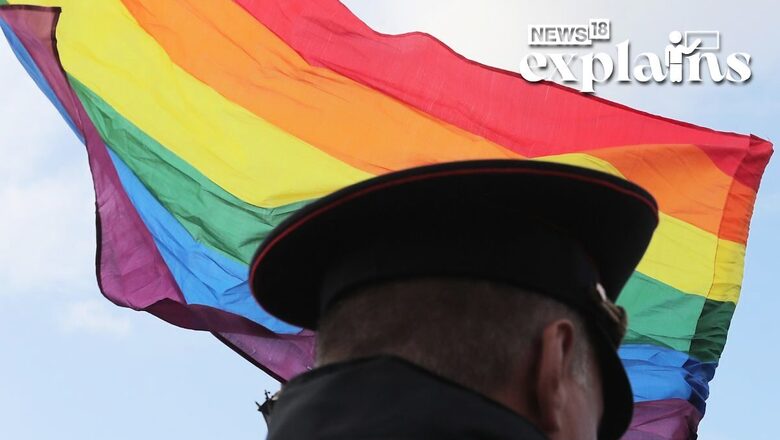
views
In Russia, President Vladimir Putin signed a new law that prohibits gender-affirming procedures, dealing a devastating blow to the already vulnerable LGBTQ+ community. The bill, unanimously approved by both houses of parliament, bans medical interventions aimed at changing a person’s sex and also prevents individuals from changing their gender on official documents.
The only exception allowed is for medical treatment related to congenital anomalies. Additionally, the law invalidates marriages in which one person has changed gender and prohibits transgender individuals from becoming foster or adoptive parents. This move aligns with the Kremlin’s efforts to protect what it perceives as traditional values and combat so-called “Western anti-family ideology,” with some labeling gender transitioning as “pure satanism,” as per a report by Associated Press.
The Russian government’s crackdown on LGBTQ+ rights began a decade ago when Putin emphasized a focus on “traditional family values” with support from the Russian Orthodox Church. Subsequent legislations have restricted public endorsement of nontraditional sexual relations among minors and outlawed same-sex marriage and the propagation of nontraditional sexual relations among adults.
Meanwhile, in China, Xi Jinping’s government has intensified its crackdown on LGBTQ+ advocacy groups, according to a July Reuters report. The Beijing LGBT Center, a prominent organization providing support and advocacy for the LGBTQ+ community, became the latest to close under government pressure this month.
The center announced its closure on its official WeChat account, leaving the community without a vital safe space. China’s Ministry of Civil Affairs, which oversees nonprofits, did not respond to requests for comment on the matter. This closure marks a significant blow to LGBTQ+ advocacy efforts, as the center was at the forefront of pushing for rights and providing low-cost mental health counseling. Previously, LGBTQ+ rights groups in China faced increasing restrictions and police pressure. Many organizations operated without official registration, as government approval was difficult to obtain.
Police would invite groups to unofficial meetings, sometimes in private spaces, to monitor their activities. Several organizations, including the LGBT Rights Advocacy China, have been forced to shut down, and police pressure has become more pervasive. Additionally, social media platforms like WeChat have shut down accounts discussing LGBTQ+ topics, forcing some groups to change their names to avoid censorship.
Despite the challenges, LGBTQ+ advocacy efforts in both Russia and China persist. However, the recent crackdowns have made it increasingly difficult for such groups to operate openly, share information with the community, and push for policy changes.
While traditionalist, and ‘anti-Western’ philosophy are often cited behind such moves, the US too is seeing a wave of anti-LGBTQ legislation and efforts, and are credited with having spread the ideology to other parts of the world, as well.
As anti-LGBTQ+ sentiment faced defeats in the US, certain groups from the religious right began to spread their ideologies globally, finding fertile ground in Africa, eastern Europe, and Latin America, according to a report by The Guardian. The American evangelical and Catholic right has played a significant role in the international arena, creating a network of anti-LGBTQ+ activists who share ideas, messaging, and funding. Now, the strategies used overseas have been re-imported to the US, where a resurgent domestic religious right is pushing for laws that target LGBTQ+ rights.
The involvement of US groups in Africa, eastern Europe, and Latin America has been instrumental in shaping legislation and legal battles, the report explains. The European religious right’s argument that religion-based objections should override LGBTQ+ rights was recently used in a US Supreme Court case, potentially allowing businesses to discriminate against LGBTQ+ individuals. The circulation of policy ideas and solutions globally has become more prevalent, with the US playing a significant role.
One prominent figure in this movement is Scott Lively, known for his controversial book “The Pink Swastika,” which falsely claimed that Hitler and the Nazi leadership were gay. Lively and other US Christian right organizations have spent significant amounts of money abroad, contributing to the introduction of anti-LGBTQ+ bills in various countries, including Uganda, Ghana, Kenya, and Tanzania.
In Europe, the US Christian right has focused on legal infrastructure, capitalizing on their extensive experience in litigation on social issues. Hungary and Poland are examples of countries that have implemented laws targeting LGBTQ+ individuals, with US groups such as the American Center for Law and Justice and the Alliance Defending Freedom providing backing.
Leaders from the global religious right regularly convene at forums like CPAC, World Congress of Families, and Political Network for Values to exchange ideas and strategies, as per the report.
In Europe, the religious right’s messaging evolved in the 1990s in response to social advances that expanded LGBTQ+ rights and access to abortion. The Vatican developed the term “gender ideology,” which was later imported by the US religious right. The European religious right positions itself as a defender of human rights but uses this to push for a more restrictive definition of rights, especially when it comes to LGBTQ+ issues.
The US Christian right has spent substantial amounts of money abroad, supporting anti-LGBTQ+ efforts in countries like Uganda, Ghana, Kenya, and Tanzania. The religious right’s influence has contributed to a rise in anti-LGBTQ+ sentiment and legislation globally. Uganda’s case is particularly significant, where US groups’ campaigns generated a dangerous climate by spreading misinformation about LGBTQ+ people.
The religious right and Museveni in Uganda have used the narrative of “social imperialism” to resist LGBTQ+ rights and frame the expansion of LGBTQ+ rights as a form of colonialism, according to The Guardian. Propaganda, misinformation, and comparison to genocidal figures like Nazis have been used by both African and US religious right leadership to incite fear and opposition to LGBTQ+ rights.
The solutions to this issue are challenging, with some calling for intervention from leaders like Pope Francis. Engaging communities and humanizing LGBTQ+ individuals are critical steps in countering the harmful narratives spread by the religious right. Raising awareness about the impact of the religious right’s influence is essential to safeguarding LGBTQ+ rights globally, experts say.
With inputs from agencies




















Comments
0 comment